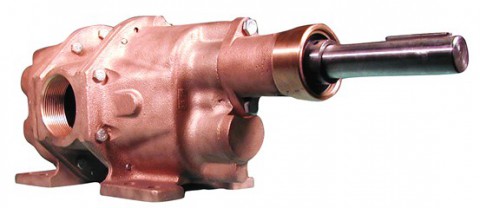PT FTS Indonesia
Pump housings and gears are made of top quality bronze, shafts are 303 stainless steel. Bearings are made of high performance carbon-graphite material selected for wear resistance and long service life. Gear pumps are positive displacement pumps. Each shaft revolution displaces a definite amount of liquid relatively unaffected by the backpressure in the discharge line. Shaft speed and flow are directly proportional.
Gear Pumps N26HDP
FEATURES
- All Bronze Casting and Stainless Steel Shafts
- Sealing Arrangement Interchangeable in Field with Proper Kit
- Outboard Ball Bearing Support for Belt Drive Applications
- Self Lubricating Carbon Bearings
DRIVE
Direct drive is the recommended drive arrangement. This pump is suitable for belt drive applications without needing pillow block bearings to achieve acceptable pump life. Correct alignment is absolutely essential for satisfactory pump life. Recheck alignment after piping has been connected to the pump. DRIVE & ALIGNMENT
LIQUIDS & TEMPERATURES
High temperature accelerates wear. Keep as close to room temperature as possible.
SUCTION LIFT
A rotary gear pump is capable of lifting water on the suction side as high as 20 feet. Though gear pumps are self-priming, a foot valve is recommended. For pumping water directly from streams or ponds, a wire mesh strainer must be used at the beginning of the suction line to prevent stones from entering the pump. Strainer and foot valve are commercially available as combination units.
SEAL CONVERSION KITS
Seal conversion kits illustrated (on back) are designed for quick removal and replacement. In each case, seal housings are fastened to pump bodies by means of 2 bolts, item 13.
IMPORTANT: Before attempting to remove a seal housing containing seal components by sliding them off the pump shaft, be sure to unlock 2 set screws locking the ball bearing inner race to the pump shaft. The ball bearing is identified as item 20. Also, before attempting to slide the seal housing from the pump shaft, remove all burrs, scale, and projections that could be formed by fretting corrosion.
SERVICE WEAR FACTORS:
SPEED – High speed accelerates wear. For longer service life keep speed as low as possible. Pump speeds above 900 RPM not recommended except for intermittent duty and pressures below 100 psi.
PRESSURE – High pressure accelerates wear. For longer service life keep pressure as low as possible.
LIQUID CONTAMINATION– Impurities like fine abrasive silt or sand accelerate wear. Keep liquid as clean as possible.
LIQUID LUBRICITY– Lubricants increase service life many fold. Use lubricant additives whenever possible.
Order Enquiry Form
Contact form description text






